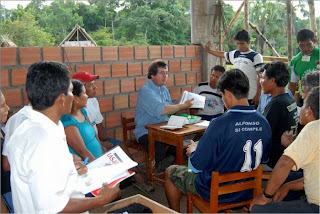
LOVE THE HONEY BEES This blog is dedicated to providing information about the honey bee. We celebrate the honey bee through "An Evening in Honor of the Sacred Honey Bee" with traditional Bulgarian bee rituals, songs, music, poetry and dance. Our second "Evening..." was held August 15, 2009 at Pt. Reyes Dance Palace, in celebration of the first National Honey Bee Awareness Day. Pictured are Gradina Balkan Music Ensemble: http://www.traditionalfun.org/gradina_about.html
Sunday, April 24, 2011
Beekeeping Project Empowers Peruvian Indigenous Group
When he goes to visit the Maijuna people in the Peruvian Amazon, Mason student German Perilla is welcomed by the name they gave him — “ua” — which means, simply, “bee.”
An appropriate name, given that last year Perilla brought more than 600,000 honeybees to their small community as part of a beekeeping program through his studies at Mason. Perilla is pursuing a master’s degree in interdisciplinary studies, with a focus in environmental science and community engagement.
Tucked away in a remote part of the northeastern Peruvian Amazon, the Maijuna Indians are a very isolated group of forest-dwellers. Today, there are approximately 400 Maijuna individuals living in four communities. Perilla began working with the Maijuna through Mason professor Michael Gilmore, an ethnobiologist who’s been working with the Maijuna for many years and helping them maintain their cultural, biological and ecological traditions.
Twice a year, Perilla travels to the Amazon to do workshops and classes with the Maijuna. It’s not an easy journey. After a nine-hour plane ride to Iquitos, the capital of the Peruvian Amazon, Perilla then travels by boat for almost 24 hours to reach Maijuna lands.
Once there, Perilla teaches the beekeepers about the biology, ecology and behavior of bees, the flowering cycle of jungle plants and practical management of the hives. The group will also learn how to harvest honey and wax and make products such as candles, jams and creams.
Love at First Sight
Ever since he first started working with bees, Perilla was, well, stung by the idea.
“The very moment we opened the hive, it was love at first sight. I’ve been working with bees ever since,” he says.
Perilla has worked on beekeeping projects all over the world. As part of the United Nations Solidarity Network in his home country of Colombia, Perilla worked with refugees of war, showing them economic opportunities with bees and small animals. In Israel, he participated in the Bees for Rural Development program.
His Maijuna beekeeping project is funded in part by the Rainforest Conservation Fund and Mason’s New Century College, as well as by private donations.
Gilmore says that Perilla’s project is perfect in many ways.
“I’m most excited about the fact that the Maijuna can use the beekeeping project for income, but still maintain their traditional lifestyle,” he says. “The bees will provide an economic means to these communities without causing any environmental destruction.”
Empowering a Community
But perhaps the most important component of the project is the community empowerment it provides.
Many of the older Maijuna do not know how to read or write, but this program allows them to provide for their families and communities. Perilla is also helping the community develop a co-operative to which the beekeepers will sell all their raw materials wholesale. The co-op will then make all the byproducts, market and promote their products and resell them to consumers.
“They have to learn to relate commercially to their product and learn about taxes and law,” says Perilla, who is passionate about training the Maijuna not only how to work with bees but also how to have confidence and power.
“One of the failures I’ve found in these types of programs is that they’ll train them to be beekeepers. And that’s it. That doesn’t work.”
The co-operative will allow the communities to earn money that they can use for needed services such as medical care, school supplies and clothing. Perilla and Gilmore are also helping the Maijuna on a greater scale to protect their ancestral land from government development and outside poachers by giving them the confidence to control their own destiny.
“They are incredibly involved in the project,” says Gilmore. “German is excited about this project, and the Maijuna are, too. They view the project as their own, and that’s really important and central to the goals of this project.”
Says Perilla: “For me, it has been a real fulfillment of life. You can really make a difference there, and that is what is important to me. Conditions may be harsh in many respects, but the satisfaction you get from doing this is worth it. Whatever it is, I’m contributing to saving the Amazon and empowering these people, so I’m proud of this moment.”
Subscribe to:
Post Comments (Atom)



No comments:
Post a Comment